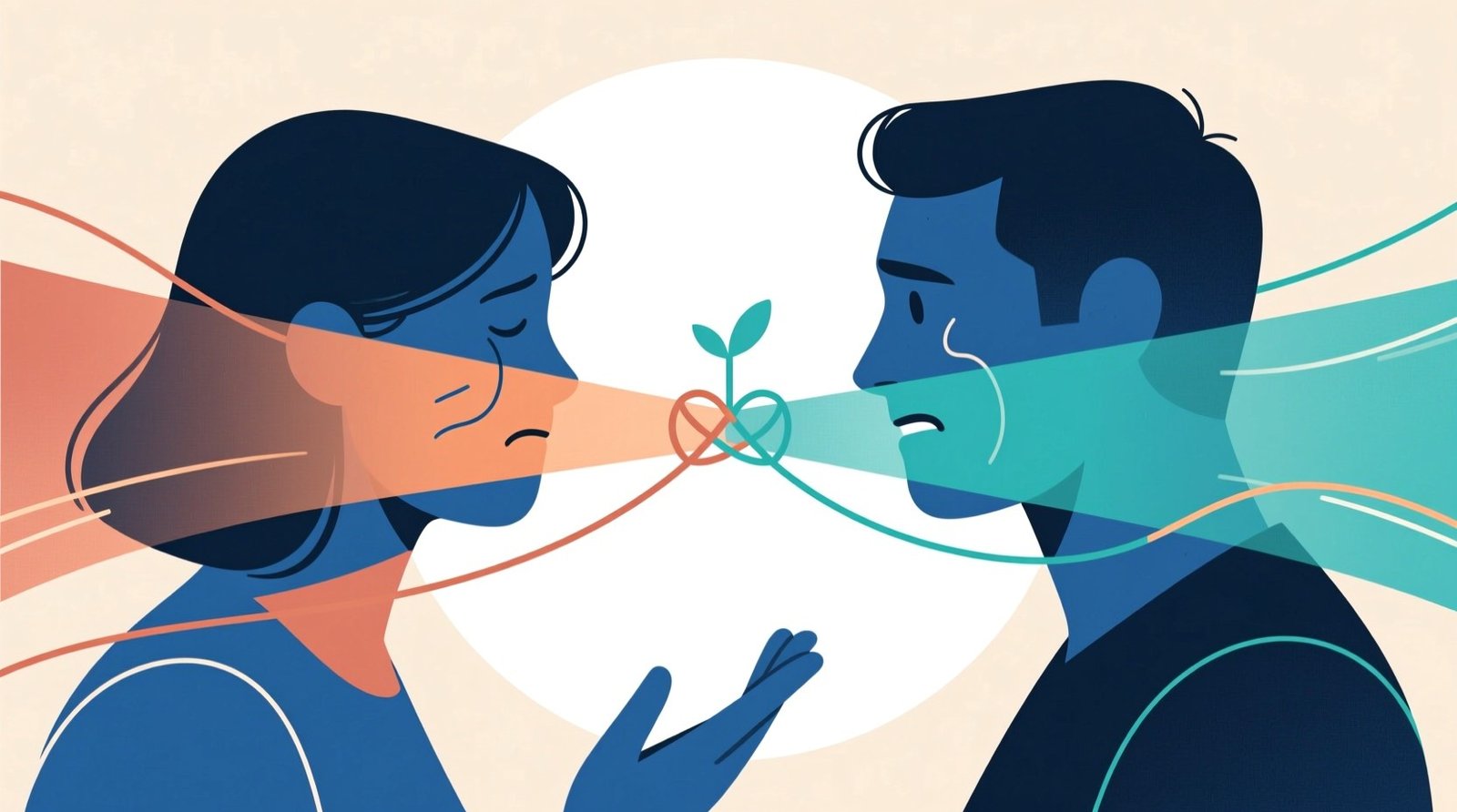In today’s fast-paced, digitally connected world, modern relationships face unique challenges. One of the most transformative concepts in nurturing a healthy relationship is vulnerability. When coupled with the importance of mental health, embracing vulnerability can lead to deeper connections, improved communication, and personal growth. In this comprehensive guide, we will explore how vulnerability intersects with mental health in modern relationships, discuss common challenges, and offer practical strategies for embracing vulnerability to foster stronger, healthier bonds.
Understanding Vulnerability in Relationships
Vulnerability is often misunderstood as weakness, but in reality, it is a powerful tool for growth and intimacy. Vulnerability in relationships involves being open, honest, and authentic—sharing your feelings, fears, and dreams with your partner. This openness fosters trust, allowing both partners to create a safe space for genuine connection.
- Defining Vulnerability: It is the willingness to expose your inner self, even when it feels risky.
- The Connection with Authenticity: Embracing vulnerability means accepting your true self and allowing others to do the same.
The Role of Mental Health in Modern Relationships
Mental health is a critical component of overall well-being, influencing how we think, feel, and interact with others. In relationships, mental health can shape communication patterns, emotional responses, and the ability to trust and connect.
- Emotional Resilience: Good mental health supports resilience, helping individuals manage stress and setbacks.
- Impact on Relationship Dynamics: Mental health challenges, such as anxiety or depression, can create barriers to vulnerability if not addressed.
- Mutual Support: When both partners prioritize mental health, they are better equipped to support each other and build a stable, loving relationship.
Why Vulnerability Matters
Building Trust and Connection
When partners share their vulnerabilities, they establish a foundation of trust. Knowing that you can reveal your deepest thoughts without judgment builds a connection that is hard to replicate with surface-level interactions.
Enhancing Communication
Openness fosters honest dialogue. Discussing fears and insecurities can lead to better conflict resolution and prevent misunderstandings.
Personal Growth
Facing vulnerability can lead to personal breakthroughs. It allows individuals to confront and overcome internal struggles, leading to improved self-esteem and personal development.
Common Mental Health Challenges in Relationships
Anxiety and Fear of Rejection
Anxiety can prevent individuals from opening up, fearing judgment or rejection. This fear can inhibit meaningful conversations and hinder emotional closeness.
Depression and Emotional Withdrawal
Depression may cause a withdrawal from emotional intimacy. Partners dealing with depression might find it challenging to engage fully, making vulnerability even harder to achieve.
Past Trauma
Past experiences, particularly traumatic ones, can create lasting scars that make vulnerability feel risky. Overcoming these hurdles often requires professional guidance.
Stress and Burnout
Modern lifestyles often come with high stress and burnout, reducing the emotional energy needed to engage vulnerably in relationships.
The Benefits of Embracing Vulnerability
Improved Emotional Intimacy
When both partners are willing to share their vulnerabilities, it creates a bond that deepens emotional intimacy and mutual understanding.
Increased Resilience
Vulnerability can build resilience by encouraging individuals to face their fears and challenges head-on. This process often leads to personal growth and a stronger sense of self.
Enhanced Problem-Solving
Open and honest communication allows couples to address issues more directly, leading to better problem-solving and conflict resolution.
Greater Relationship Satisfaction
Research shows that couples who embrace vulnerability report higher satisfaction in their relationships. Authenticity and openness contribute to a more fulfilling partnership.
Barriers to Vulnerability
Fear of Judgment
One of the most significant barriers is the fear of being judged or misunderstood. This fear can cause individuals to hide their true feelings.
Cultural and Social Norms
Societal expectations and cultural norms sometimes discourage open displays of vulnerability, particularly in traditional or conservative communities.
Past Negative Experiences
Experiences of betrayal or rejection in the past can make it challenging to trust and be vulnerable with a new partner.
Internalized Beliefs
Deep-seated beliefs about what it means to be “strong” or “self-reliant” can conflict with the idea of vulnerability, making it seem counterintuitive.

Effective Communication and Vulnerability
The Role of Active Listening
Active listening is crucial when sharing vulnerabilities. It involves fully concentrating, understanding, and responding thoughtfully to your partner’s expressions.
Expressing Emotions Clearly
Clear communication of your feelings helps avoid misunderstandings. Use “I” statements to express how you feel rather than blaming or accusing your partner.
Non-Judgmental Responses
Creating a non-judgmental space encourages more open sharing. Both partners should strive to listen without immediately offering solutions or criticisms.
Setting Boundaries
Vulnerability does not mean sharing every detail immediately. Setting and respecting boundaries ensures that both partners feel safe and comfortable.
Practical Strategies to Embrace Vulnerability
Practice Self-Reflection
Spend time understanding your emotions and triggers. Journaling or meditation can help identify what makes you feel vulnerable and why.
Gradual Exposure
Start by sharing small, less intimidating vulnerabilities. As trust builds, you can gradually open up more about deeper issues.
Develop Trust Over Time
Trust is not built overnight. Consistently showing empathy and understanding helps create an environment where vulnerability is welcomed.
Use “I” Statements
Communicate your feelings using “I” statements to express your emotions without sounding accusatory. For example, “I feel anxious when…” instead of “You make me anxious.”
Seek Professional Guidance
Sometimes, discussing vulnerabilities with a therapist can provide the tools needed to open up safely and effectively.
The Impact of Social Media and Modern Dating
Social Media Pressure
Social media can often present unrealistic portrayals of perfect relationships, increasing the fear of vulnerability. Constant comparison may lead to self-doubt and reluctance to share true emotions.
Digital Communication Barriers
Modern dating often starts online, where the lack of face-to-face interaction can impede the development of deep, emotional connections. Embracing vulnerability online requires extra effort and mindfulness.
The Role of Technology in Emotional Disconnect
While technology connects us, it can also lead to superficial interactions. Balancing digital communication with in-person connection is key to fostering genuine vulnerability and trust.
Overcoming the Fear of Exposure
Learning to filter out the negative aspects of social media and focusing on authentic connections can help reduce the fear of vulnerability in digital interactions.
The Role of Therapy and Professional Support
Benefits of Couples Therapy
Couples therapy can offer a structured environment for exploring vulnerability. Therapists can guide couples in developing healthier communication patterns and overcoming barriers to intimacy.
Individual Counseling
Individual therapy provides a safe space to explore personal vulnerabilities and mental health challenges. It can empower you to share more openly with your partner.
Group Therapy and Support Groups
Group therapy or support groups offer opportunities to hear others’ experiences with vulnerability and mental health. This shared understanding can reduce feelings of isolation and foster community support.
Online Resources and Workshops
Many online platforms offer workshops, webinars, and courses focused on vulnerability and mental health. These resources can provide additional tools and strategies for improvement.
Building a Support System
Lean on Trusted Friends and Family
A robust support system outside of your relationship can provide additional perspectives and comfort. Trusted friends and family members can help reinforce your emotional well-being.
Community Engagement
Participating in community activities or groups with similar interests can create a sense of belonging. This engagement not only supports mental health but also reinforces the importance of vulnerability in building meaningful connections.
Professional Networks
For those who struggle with vulnerability in professional settings, networking groups and mentorship can offer support and guidance. Sharing experiences with trusted colleagues can help normalize vulnerability in all areas of life.
Self-Care and Mindfulness Practices
The Importance of Self-Care
Prioritizing self-care is vital for maintaining mental health. When you take care of your emotional needs, you’re better prepared to engage vulnerably in your relationships.
Mindfulness Techniques
Mindfulness practices such as meditation, deep breathing, and yoga can help center your thoughts and reduce anxiety. These techniques promote a calm state of mind, making vulnerability less daunting.
Establishing Healthy Routines
Developing a routine that includes regular exercise, balanced nutrition, and adequate sleep can significantly impact your mental health. A healthy body supports a healthy mind, making it easier to navigate emotional challenges.
Journaling Your Journey
Writing about your thoughts and feelings can be a therapeutic exercise. Journaling helps you understand your triggers and progress, and it can serve as a reference point for your growth in embracing vulnerability.
Real-Life Success Stories
Overcoming Relationship Barriers
Many couples have transformed their relationships by embracing vulnerability. For instance, one couple found that sharing their personal struggles allowed them to develop a deeper empathy for one another. They began attending counseling together and gradually learned to communicate their needs more effectively, resulting in a stronger, more resilient partnership.
Personal Growth Through Vulnerability
Individuals who have taken steps to address their mental health challenges often report significant personal growth. By acknowledging their vulnerabilities and seeking help, they have been able to overcome longstanding issues, improve self-esteem, and develop healthier relationships with others.
Community Initiatives and Workshops
There are numerous examples of community-led initiatives where individuals come together to share experiences and support one another. Workshops focusing on mental health and vulnerability provide practical tools and foster environments where participants feel safe to express their true selves.
Conclusion
Embracing vulnerability in modern relationships is not merely an act of openness; it is a pathway to deeper connection, personal growth, and mental well-being. By understanding the importance of vulnerability, addressing mental health challenges, and implementing practical strategies, individuals and couples can build relationships that are resilient, authentic, and fulfilling.
In today’s digital age, where superficial interactions often dominate, choosing to be vulnerable can set you apart and pave the way for genuine, meaningful connections. Whether through open communication, seeking professional support, or practicing mindfulness, every step you take toward embracing vulnerability is a step toward a healthier, more connected future.
Remember, vulnerability is not a sign of weakness but a courageous choice to be true to yourself and those you love. As you embark on this journey, keep in mind that building a supportive network and prioritizing self-care are essential. With time and effort, embracing vulnerability can transform your relationships and lead to profound personal and collective growth.
By integrating these strategies into your life, you not only enhance your own mental health but also contribute to a more empathetic and connected society—one where authenticity and vulnerability are celebrated as the true marks of strength.







[…] the holiday into a day of giving by volunteering or donating to charities that support mental health, animal welfare, or social […]
[…] the fear of falling in love, can be debilitating for those who experience it, leading to avoidance of relationships and emotional distress. Fortunately, various therapeutic modalities can aid individuals in […]
[…] healthy partnership is an ecosystem where two people actively contribute to and benefit from the relationship in ways that nourish their individual lives and their life […]